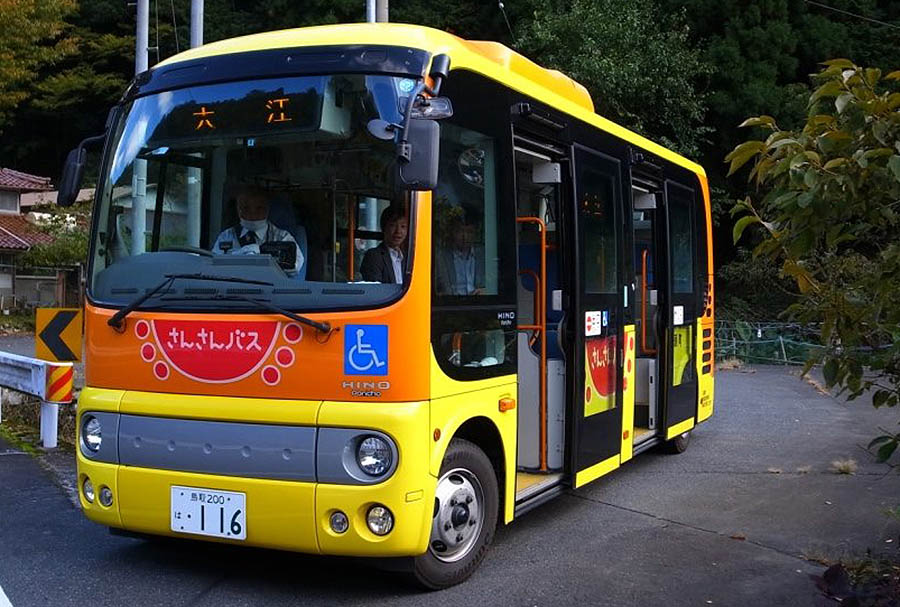SoftBank's Robot Buses to Take Grandparents Home on Country Roads

EghtesadOnline: If you had to invent the perfect place to roll out self-driving buses, Japan would be it.
The country boasts an immaculate and extensive road network. Much of the aging population relies on public transport, especially in the countryside, to get around. And that customer base is shrinking; fewer passengers equals less fares. As a result, only a third of the country's bus companies are profitable, forcing regional governments to step in to support them.
That's why SoftBank Group Corp. is building driverless buses, which the Tokyo-based company estimates can cut operating costs by half. Self-driving cars, like those being developed by Uber Technologies Inc., Google and automakers have to be smart enough to traverse unpredictable environments. Buses, on the other hand, follow predetermined routes and can get away with a lower level of machine intelligence. If the Japanese technology and telecommunications company succeeds, its automated buses could be navigating streets as soon as 2019.
"Japan's aging population is putting the country on the front line of a public transportation crisis," said Yuki Saji, 31, chief executive officer of SB Drive Corp., the SoftBank unit that's leading the project. "There is an opportunity for a rapid introduction of this technology. Bus companies want to improve margins, local governments need to cut subsidies for money-losing routes and residents demand convenience."
Introduced in April, SB Drive is a joint venture with Advanced Smart Mobility Co., a University of Tokyo artificial-intelligence enterprise being led by a Toyota Motor Corp. veteran. With a prototype already navigating a closed course, four Japanese towns and cities have signed up to test the vehicles on actual bus routes as soon as next year.
SoftBank plans to sell the self-driving buses to cities and transit operators. It's an opportunity to grab a piece of a broader market that's projected to be worth as much as $77 billion by 2035.
"A number of very complex technologies have to come together to enable autonomous driving," said Jeremy Carlson, an analyst at IHS Markit who covers the sector. "That means smaller and often newer companies can carve out a niche of highly specialized expertise."
Some of the technical building blocks are already in place. Japan spent spent more than two decades building out a nationwide network of FM transmitters, radio and infrared beacons that track road and traffic conditions, called the Vehicle Information and Communication System.
"Technological barriers for buses are lower that those for self-driving cars, because you can foresee a lot of the trouble along the route," said Naoki Suganuma, who heads Kanazawa University's self-driving research lab.
Sensing an opportunity, others are already taking a serious look at driverless buses. Autonomous shuttles developed by Swiss robotics company EasyMile are already ferrying students around the campus of Wageningen University in the Netherlands. Daimler AG is investing 200 million euros ($223 million) in a city bus project, after debuting a self-driving prototype in July. Zhengzhou Yutong Group Co. completed a trialon an 32.6-kilometer intercity road with 26 traffic lights last year.
The challenges extend beyond autonomous driving. Passengers will expect the same level of service as they do from human drivers, such as answering questions about schedules and routes. That's why SB Drive's buses will be linked to remote personnel standing by to help.
The project is part of SoftBank founder Masayoshi Son's desire to push the company beyond its telecom roots and deeper into the internet of things. As part of his 30-year plan to embrace artificial intelligence and networked devices, the CEO gambled $32 billion to acquire chip designer ARM Holdings Plc this month.
The driverless bus project can use "SoftBank's and ARM expertise, as well as the company's own software," said Hideki Yasuda, an analyst at Ace Research Institute. "Cars are being electrified and digitized, and from that perspective this plays to SoftBank's strengths."
Saji got the idea for SB Drive while working at a division overseeing SoftBank's mobile-phone shops. After responding to an internal call for new business ideas, he made his pitch to SoftBank President Ken Miyauchi, and got his driverless bus plan approved.
In a recent trial in Yazu, a municipality of 18,000, Saji and his colleagues were the only people on a 30-minute bus ride along one of the existing routes. "In places like that, grandpas and grandmas live by the bus schedule," Saji said. "In 5 to 10 years, when the rest of Asia faces its own aging populations, SoftBank will have a business ready to go."


